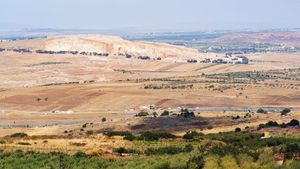The International Football Federation (FIFA) is facing significant backlash after displaying a controversial map during the draw for European World Cup qualifiers, which appeared to depict Ukraine without Crimea as part of its territory. This incident has triggered strong reactions from Ukrainian officials and the public, as well as raising questions about FIFA's stance on geopolitical issues.
According to the Ukrainian Football Association (UAF), the map was shown on December 13 during the broadcast of the European qualifiers for the 2026 World Cup. The graphic was intended to highlight countries unable to compete against each other due to geopolitical reasons, such as Ukraine and Belarus. Yet, the map simply showcased Ukraine without including Crimea, making it look like it was under Russian control.
Heorhii Tykhyi, spokesperson for Ukraine's Ministry of Foreign Affairs, voiced strong concerns over the perceived political ramifications of the map. He took to social media platform X (formerly Twitter) stating, "Are you okay, @FIFAcom? By redrawing international borders in yesterday's broadcast, you not only acted against international law, but also supported Russian propaganda, war crimes, and the crime of aggression against Ukraine." He asserted expectations for FIFA to deliver a public apology.
FIFA responded swiftly to the outcry, indicating it was "aware of the issue" concerning the graphic displayed during the draw. The organization confirmed the map segment had been removed from their broadcasts and acknowledged discussions with the involved federations to prevent similar incidents. "We have addressed the situation with the federation," FIFA stated, aiming to clarify its position. They emphasized their respect for Ukraine's territorial integrity.
The UAF also expressed its dismay about the map, criticizing FIFA's presentation. It's worth noting their correspondence with FIFA Secretary General Mattias Grafström and UEFA Secretary General Theodore Theodoridis, highlighting their concerns. The UAF letter pointed out, "We are writing to express our deep concern about the infographic map of Europe shown during the TV broadcast of the European Qualifiers draw. The version of the map presented by FIFA is unacceptable and inconsistent with the international stance on this issue."
This diplomatic spat is compounded by the historical backdrop of Crimea's annexation by Russia following the controversial 2014 referendum. The peninsula, which hosts Russia's Black Sea Fleet, is strategically significant for Moscow, and its annexation has been consistently condemned by Ukraine and many Western nations. President Volodymyr Zelenskyy of Ukraine has vowed to end Russia's occupation of Crimea and has often referred to the need for international support to achieve this goal.
Svetlana Zhurova, the Olympic champion and State Duma deputy, expressed contrarian sentiments, asserting FIFA's representation of Crimea was correct according to Russian narratives. "Crimea is ours, and FIFA knows about it. There can be no other options—Crimea became part of Russia following the referendum, this is the will of the people. I think FIFA will not apologize to Ukraine," she stated.
Despite the internal Russian politics surrounding the situation, the broader international community remains largely sympathetic to Ukraine's position. This episode has been viewed as emblematic of the discrepancies existing between sports organizations and international law concerning territorial disputes.
The 2026 World Cup is set to take place across the United States, Canada, and Mexico, with Ukraine positioned in Group D alongside teams like Iceland and Azerbaijan. With footballing sanctions against Russia still in effect due to its military actions against Ukraine, hopes remain tense for the national teams caught up in these geopolitical tensions.
This incident raises pertinent questions about how international sporting bodies, like FIFA and UEFA, navigate complex geopolitical landscapes, especially when their actions can inadvertently endorse controversial political narratives. The dialogue surrounding the map incident reveals just how sensitive these issues can be, not only for affected nations like Ukraine but also for global sporting entities striving to maintain their neutrality.
While FIFA has acted to remove the offending graphic from their publications, the repercussions of this controversy reveal the broader challenges facing global sports organizations as they engage with geopolitical realities. With tensions reshaping the international order, sporting events will likely continue to serve as stages for airing political grievances, complicing FIFA’s role as the world’s governing body for football.



